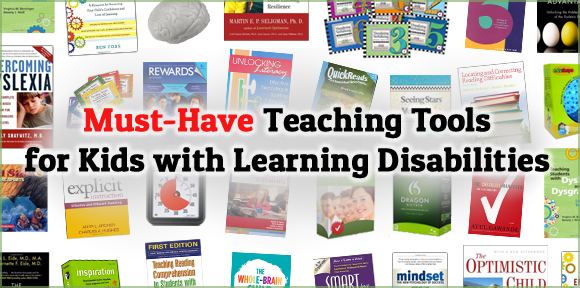Have you ever been over the moon to receive a new teaching book you ordered, only for it to fall flat?
Have you ever wondered what great books and tools your colleagues are using?
Today, I’d like to invite you to a virtual visit of my office. Let me show you my favorite books, games, tools, and software programs. I’ve highlighted several of my favorite materials below, but feel free to hop over to our resources page for a complete list of teaching goodies.
I’d love to hear your suggestions too! What are some of your favorite teaching resources? Please chime in by sharing a book, program, or material you love in the comments section.
Teaching Kids to Read

1. Locating and Correcting Reading Difficulties
by Ward Cockrum and James L. Shanker
If you’ve just started working with a struggling reader and you’re not sure where to begin, this is an essential tool in your literacy toolbox. You can use a variety of informal assessments to pinpoint a student’s area of difficulty. The book also includes activities to build up those skills. I especially like to use this book to measure progress in phonics, multisyllable decoding, and sight word acquisition. (www.baytreeblog.com/difficulties)
2. Seeing Stars Letter Cards
I use these cards to teach kids sound-symbol correspondence (i.e. learning the sounds that letters make). They’re sturdy enough for daily use. (www.baytreeblog.com/vccards)
3. Seeing Stars Decoding Workbooks
Once kids have cracked the alphabetic code, they need tons of practice decoding. These workbooks are divided into six levels based on word length. I find workbooks #2 and #3 most useful. The first workbook includes CV/VC words with just two sounds, the second workbook includes CVC words with three sounds, and the third workbooks include CVCC/CCVC words with consonant blends. I like to use these words as a jumping off point for phonemic and orthographic awareness activities. (www.baytreeblog.com/seeingstarsworkbooks)
4. Quick Reads
Once kids are decoding accurately, they need to apply their skills. The Quick Reads program includes short passages that can be used for repeated reading and other activities that build reading fluency. I like that the articles are grouped by topic so that students get many exposures to topic-specific vocabulary. (www.baytreeblog.com/quickreads)
5. Unlocking Literacy: Effective Decoding and Spelling Instruction
by Marcia K. Henry
New to teaching reading? Not sure how to best help a struggling reader? This is THE book for you. Henry shows how children learn to read and how to best teach literacy. She focuses on morphology (the meaning system) and orthography (the writing system), which are two vital, but overlooked, layers of language. The 100-page appendix of prefixes, suffixes, and bases is worth the price of the book alone. This is an invaluable resource, especially for teachers of children in the intermediate grades. (www.baytreeblog.com/unlockingliteracy)
6. REWARDS
by Vicky Vachon, Mary Gleason, and Anita Archer
Anyone who’s offering you a silver bullet for solving reading problems is probably selling snake oil. However, this inexpensive, accessible program is probably the closest thing to a decoding cure-all. Here’s why. Each lesson includes explicit, structured practice with:
- a vowel pattern
- decoding a single syllable words with that vowel pattern, and
- a multisyllable decoding strategy.
Students are taught to identify common prefixes and suffixes, so they can successfully read multisyllable words. I’ve seen kids’ reading ability grow by leaps and bounds. The intermediate version is for children in grades 4-5. The standard version is appropriate for middle school students, high school students, and adults. (www.baytreeblog.com/rewards)
Continue reading “25 Must-Have Tools for Learning Specialists, Educational Therapists, and Literacy Tutors”












